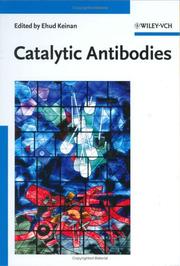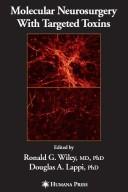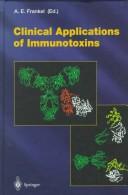| Listing 1 - 10 of 67 | << page >> |
Sort by
|

ISBN: 0824779606 Year: 1988 Publisher: New York (N.Y.) : Dekker,
Abstract | Keywords | Export | Availability | Bookmark
 Loading...
Loading...Choose an application
- Reference Manager
- EndNote
- RefWorks (Direct export to RefWorks)
Book
ISBN: 1839165154 1839165162 Year: 2022 Publisher: Croydon, England : Royal Society of Chemistry,
Abstract | Keywords | Export | Availability | Bookmark
 Loading...
Loading...Choose an application
- Reference Manager
- EndNote
- RefWorks (Direct export to RefWorks)
Chemical Linkers in Antibody-Drug Conjugates aims to shine a detailed light on the various key attributes of chemical linkers in ADCs, for drug-to-antibody ratio, for stability, for release mechanism of payload, for pharmacokinetics, for stability determination, and for efficacy and safety.

ISBN: 9783527306886 9783527306886 3527306889 3527306889 Year: 2005 Publisher: Weinheim: Wiley,
Abstract | Keywords | Export | Availability | Bookmark
 Loading...
Loading...Choose an application
- Reference Manager
- EndNote
- RefWorks (Direct export to RefWorks)
Book
ISBN: 9783319130811 3319130803 9783319130804 3319130811 Year: 2015 Publisher: Cham : Springer International Publishing : Imprint: Springer,
Abstract | Keywords | Export | Availability | Bookmark
 Loading...
Loading...Choose an application
- Reference Manager
- EndNote
- RefWorks (Direct export to RefWorks)
This authoritative volume provides a holistic picture of antibody-drug conjugates (ADCs). Fourteen comprehensive chapters are divided into six sections including an introduction to ADCs, the ADC construct, development issues, landscape, IP and pharmacoeconomics, case studies, and the future of the field. The book examines everything from the selection of the antibody, the drug, and the linker to a discussion of developmental issues such as formulations, bio-analysis, pharmacokinetic-pharmacodynamic relationships, and toxicological and regulatory challenges. It also explores pharmacoecomonics and intellectual properties, including recently issued patents and the cost analysis of drug therapy. Case studies are presented for the three ADCs that have received FDA approval: gemtuzumab ozogamicin (Mylotarg®), Brentuximab vedotin (Adcetris®), and ado-trastuzumab emtansine (Kadcyla®), as well as an ADC in late-stage clinical trials, glembatumumab vedotin (CDX-011). Finally, the volume presents a perspective by the editors on the future directions of ADC development and clinical applications. Antibody-Drug Conjugates is a practical and systematic resource for scientists, professors, and students interested in expanding their knowledge of cutting-edge research in this exciting field.
Biomedicine. --- Pharmaceutical Sciences/Technology. --- Medicine. --- Pharmaceutical technology. --- Médecine --- Techniques pharmaceutiques --- Antibody-drug conjugates. --- Antibody-toxin conjugates. --- Drugs -- Research. --- Health & Biological Sciences --- Pharmacy, Therapeutics, & Pharmacology --- Conjugates, Antibody-toxin --- Immunoconjugates --- Immunoglobulin-toxin conjugates --- Immunotoxins --- Toxin-antibody conjugates --- Toxin-immunoglobulin conjugates --- Conjugates, Antibody-drug --- Drug-antibody conjugates --- Drug immunoconjugates --- Drug-immunoglobulin conjugates --- Immunoconjugates, Drug --- Immunoglobulin-drug conjugates --- Bioconjugates --- Immunopharmacology --- Immunotoxicology --- Toxins --- Drugs --- Dosage forms --- Pharmaceutical laboratory techniques --- Pharmaceutical laboratory technology --- Technology, Pharmaceutical --- Technology

ISBN: 1280358157 9786610358151 159259896X 1588291995 1617374202 Year: 2005 Publisher: Totowa, N.J. : Humana Press,
Abstract | Keywords | Export | Availability | Bookmark
 Loading...
Loading...Choose an application
- Reference Manager
- EndNote
- RefWorks (Direct export to RefWorks)
The use of targeted cytotoxins to make highly selective neural lesions for both experimental and clinical purposes has already provided important animal models for diseases such as Alzheimer's, and holds great promise for research and clinical application to pain. In Molecular Neurosurgery With Targeted Toxins, pioneers in the field describe their hands-on experience with the experimental use of these toxins. The authors focus on the highly successful use of the immunotoxins, 192 IgG-saporin and ME20.4-saporin, to lesion the cholinergic basal forebrain in order to model the behavior, anatomy, physiology, and pharmacology of Alzheimer's disease in animals. Also discussed are the uses of anti-DBH-saporin immunotoxin to make remarkably selective lesions of catecholaminergic neurons, hypocretin-saporin that can produce narcoleptic animals, and other saporin conjugates, such as neuropeptide-saporin conjugates for pain research and cholera toxin B chain-saporin to produce a model of central nervous system demyelination. Overview perspectives and, in some cases, more practical details are provided that allow the reader to appreciate exactly what is involved in using these agents. Both practical and theoretical, Molecular Neurosurgery With Targeted Toxins provides readers with not only the background to understand these techniques, but also numerous real-life examples that can be readily adapted to new purposes and an ever-increasing number of new targeted toxins.
Neurotoxic agents --- Drug targeting. --- Antibody-toxin conjugates --- Therapeutic use. --- Conjugates, Antibody-toxin --- Immunoconjugates --- Immunoglobulin-toxin conjugates --- Immunotoxins --- Toxin-antibody conjugates --- Toxin-immunoglobulin conjugates --- Bioconjugates --- Immunopharmacology --- Immunotoxicology --- Toxins --- Drugs --- Site-specific drug delivery --- Targeting of drugs --- Target organs (Anatomy) --- Neuropoisons --- Neurotoxicants --- Neurotoxins --- Poisons --- Targeting --- Dosage forms --- Neurosurgery. --- Nerves --- Neurosurgery --- Surgery --- Nervous system --- Surgery.
Book
ISBN: 0081030193 0128186577 Year: 2020 Publisher: Amsterdam, Netherlands : Elsevier Limited,
Abstract | Keywords | Export | Availability | Bookmark
 Loading...
Loading...Choose an application
- Reference Manager
- EndNote
- RefWorks (Direct export to RefWorks)
Approaches to the Purification, Analysis and Characterization of Antibody-Based Therapeutics provides the interested and informed reader with an overview of current approaches, strategies and considerations relating to the purification, analytics and characterization of therapeutic antibodies and related molecules. While there are obviously other books published in and around this subject area, they seem to be either older (c.a. year 2000 publication date) or are more limited in scope. The book will include an extensive bibliography of the published literature in the respective areas covered. It is not, however, intended to be a how-to methods book.
Antibody-drug conjugates. --- Immunoglobulins. --- Antibodies --- Immune globulins --- Immune serum globulin --- Blood proteins --- Globulins --- Plasma cells --- Antibody diversity --- Antigens --- Bacterial immunoglobulin-binding proteins --- Conjugates, Antibody-drug --- Drug-antibody conjugates --- Drug immunoconjugates --- Drug-immunoglobulin conjugates --- Immunoconjugates, Drug --- Immunoglobulin-drug conjugates --- Bioconjugates --- Drugs --- Immunopharmacology --- Dosage forms
Book
ISBN: 184816629X 9781848166295 1848166281 9781848166288 Year: 2012 Publisher: London Imperial College Press
Abstract | Keywords | Export | Availability | Bookmark
 Loading...
Loading...Choose an application
- Reference Manager
- EndNote
- RefWorks (Direct export to RefWorks)
Monoclonal antibodies have become important treatments for cancer, inflammation and a wide range of other diseases, representing an increasing share of the most successful pharmaceutical markets. The technologies to discover these drugs have been developed by select centers of excellence in industry and academia, and are continually being fine tuned in the race to identify the best antibody-based drug candidates and accelerate their paths to patients. The objective of this volume is to provide a series of guides to those evaluating and preparing to enter particular areas within the field and t
Immunoenzyme technique. --- Antibody-drug conjugates. --- Immunology --- Drug development. --- Pharmaceutical biotechnology. --- Biopharmaceutical technology --- Drugs --- Biotechnology --- Pharmaceutical technology --- Development of drugs --- New drug development --- Pharmacology --- Pharmacy --- Conjugates, Antibody-drug --- Drug-antibody conjugates --- Drug immunoconjugates --- Drug-immunoglobulin conjugates --- Immunoconjugates, Drug --- Immunoglobulin-drug conjugates --- Bioconjugates --- Immunopharmacology --- Antibody enzyme techniques, Unlabeled --- Immunoperoxidase technique --- Peroxidase labeled antibody technique --- Enzymatic analysis --- Immunoassay --- Protein binding --- Technique. --- Development --- Dosage forms --- Technique
Book
ISBN: 1461454557 1489997008 1461454565 1283934132 Year: 2013 Publisher: New York : Humana Press,
Abstract | Keywords | Export | Availability | Bookmark
 Loading...
Loading...Choose an application
- Reference Manager
- EndNote
- RefWorks (Direct export to RefWorks)
The concept of delivering ‘magic bullets’ to treat diseases was first proposed by Paul Erlich in the early 1900’s. The realization of this concept for the treatment of cancer occurred in the late 1990’s with the approval of monoclonal antibody therapies. The use of monoclonal antibodies conjugated (linked) to potent cytotoxic agents (antibody-drug conjugates, ADCs) for specifically delivering cytotoxics to cancer cells was an obvious extension of antibody-based therapy. ADCs have been under intense investigation for several decades; progress, however, has been limited due to toxicity or lack of improved efficacy compared to unconjugated cytotoxics. More recently, linker technology and target selection have advanced such that several ADCs and immunotoxins are undergoing clinical testing or are approved for use. This important volume gives the latest and most comprehensive information on the topic, describing different types of ADCs and immunotoxins for both hematologic and solid malignancies. Finally, the volume highlights the promise that this technology holds for diverse types of human cancer.
Antibodies. --- Antibody-drug conjugates. --- Immunotoxins -- Therapeutic use. --- Antibody-drug conjugates --- Antibody-toxin conjugates --- Diseases --- Pharmaceutical Preparations --- Immunoconjugates --- Immunoglobulins --- Therapeutics --- Analytical, Diagnostic and Therapeutic Techniques and Equipment --- Immunoproteins --- Chemicals and Drugs --- Blood Proteins --- Proteins --- Amino Acids, Peptides, and Proteins --- Immunotoxins --- Neoplasms --- Drug Therapy --- Antibodies --- Drug Combinations --- Medicine --- Health & Biological Sciences --- Oncology --- Antibody-toxin conjugates. --- Conjugates, Antibody-toxin --- Immunoglobulin-toxin conjugates --- Toxin-antibody conjugates --- Toxin-immunoglobulin conjugates --- Conjugates, Antibody-drug --- Drug-antibody conjugates --- Drug immunoconjugates --- Drug-immunoglobulin conjugates --- Immunoconjugates, Drug --- Immunoglobulin-drug conjugates --- Medicine. --- Cancer research. --- Biomedicine. --- Cancer Research. --- Biomedicine general. --- Immune globulins --- Immune serum globulin --- Blood proteins --- Globulins --- Plasma cells --- Antibody diversity --- Antigens --- Bacterial immunoglobulin-binding proteins --- Cancer research --- Clinical sciences --- Medical profession --- Human biology --- Life sciences --- Medical sciences --- Pathology --- Physicians --- Bioconjugates --- Immunopharmacology --- Immunotoxicology --- Toxins --- Drugs --- Dosage forms --- Oncology. --- Monoclonal antibodies. --- Antibodies, Monoclonal --- Monoclonal immunoglobulins --- Molecular cloning --- Tumors --- Health Workforce --- Biomedicine, general.

ISBN: 3540640975 3642721559 3642721532 Year: 1998 Volume: 234 Publisher: Berlin : Springer,
Abstract | Keywords | Export | Availability | Bookmark
 Loading...
Loading...Choose an application
- Reference Manager
- EndNote
- RefWorks (Direct export to RefWorks)
1 2 D. FITZGERALDI, I. PASTAN , and J. ROBERTUS Introduction . . . . . . . . . . . . . I 2 Toxin Structure-Function Properties 2 2. 1 Functions. . . . . . . . . . . . . . . . . . . . . . . . 2 2. 2 Binding. . . . . . . . . . . . . . . . . . . . . . . . . 3 3 Intracellular Processing - Cleavage and Reduction . . . . . . 4 3. 1 Cytosolic Activity . . . . . . . . . . . . . . . . 5 4 Immunotoxin Design and Testing. 6 5 Conclusion. . 8 References. . . . . 8 1 Introduction While various treatment approaches for cancer include reversal of the transformed phenotype, stimulation of immune responses, inhibition of metastatic spread and deprivation of key nutrients, the goal of immunotoxin treatment is the direct killing of malignant cells. Because they are enzymatic proteins that act catalytically to kill cells, bacterial and plant toxins are often employed as the cell-killing component of immunotoxins. Here we provide background information into the structure-func tion relationships of toxins and discuss how they can be combined with cell-binding antibodies or other ligands to generate immunotoxins. Bacterial and plant toxins (e. g. , diphtheria toxin, Pseudomonas exotoxin and ricin) are among the most toxic substances known. However, because they bind to cell surface receptors that are present on most normal cells, unmodified toxins are generally useless as anti-cancer agents. To convert toxins into more selective agents, their binding domains are either eliminated or disabled and replaceq with cell binding antibodies that are tumor-selective.
Farmacologie [Immuno] --- Immunofarmacologie --- Immunopharmacologie --- Immunopharmacology --- Pharmacoimmunology --- Pharmacologie [Immuno] --- Immunotoxins --- Diphtheria toxin --- Ricin --- therapeutic use --- pharmacology --- therapeutic use. --- pharmacology. --- Therapeutic use. --- Pharmacology. --- Antibody-toxin conjugates --- Therapeutic use --- Immunology. --- Cancer research. --- Hematology. --- Cancer Research. --- Pharmacology/Toxicology. --- Drug effects --- Medical pharmacology --- Medical sciences --- Chemicals --- Chemotherapy --- Drugs --- Pharmacy --- Haematology --- Internal medicine --- Blood --- Cancer research --- Immunobiology --- Life sciences --- Serology --- Physiological effect --- Diseases --- Antibody-toxin conjugates. --- Conjugates, Antibody-toxin --- Immunoconjugates --- Immunoglobulin-toxin conjugates --- Toxin-antibody conjugates --- Toxin-immunoglobulin conjugates --- Bioconjugates --- Immunotoxicology --- Toxins
Book
ISBN: 0387575812 3540575812 3642787312 3642787290 Year: 1994 Volume: 44 Publisher: Berlin : Springer-Verlag,
Abstract | Keywords | Export | Availability | Bookmark
 Loading...
Loading...Choose an application
- Reference Manager
- EndNote
- RefWorks (Direct export to RefWorks)
Glycoconjugates --- Congresses. --- Congresses --- Cell Membrane. --- Cell membrane --- Cell Membrane --- Glycoconjugate --- Glycoproteins --- Glycosylation --- Golgi apparatus --- Oligosaccharides, conjugates
| Listing 1 - 10 of 67 | << page >> |
Sort by
|

 Search
Search Feedback
Feedback About UniCat
About UniCat  Help
Help News
News